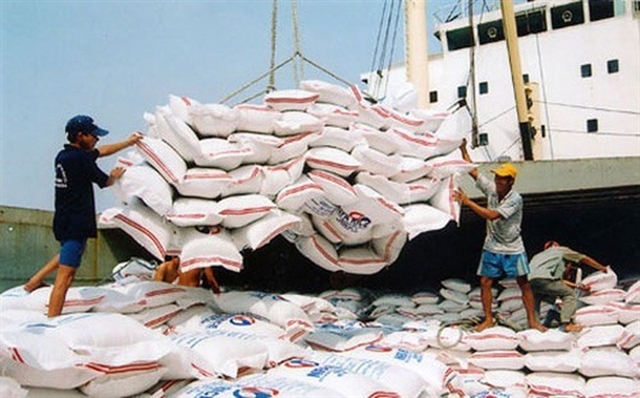 Economy
Economy


|
| Rice is loaded for export. — VNA/VNS Photo |
HÀ NỘI — The Philippine government is seeking to reduce its heavy dependence on Vietnamese rice by diversifying supply sources.
This has been informed, commented and warned about by the Việt Nam Trade Office in the Philippines to Vietnamese ministries, regulatory agencies, policy makers and businesses.
Updating information about the market and opportunities to promote rice exports at a recent trade promotion conference with Vietnamese trade offices in foreign markets, Phùng Văn Thành, Việt Nam Trade Counsellor in the Philippines, said that the Philippines produced rice, however, domestic rice production has always failed to meet consumer demand.
The advantage of Vietnamese rice in the Philippine market was that many Vietnamese rice businesses have had long-term business relationships with Philippine rice importers, creating prestige and trust with Philippine partners, said Thành.
At the same time, Vietnamese rice is suitable for the tastes, consumption habits and meets the diverse needs of Philippine consumers, from low and medium customers to the wealthy classes. The prices were affordable so the product was competitive, he added.
Furthermore, Vietnamese rice supply was stable, both in quantity and price, he said. Vietnamese rice was also able to meet the Philippines' annual import needs, while the geographical distance is cost-effective and convenient in transportation.
In particular, Việt Nam also takes advantage of the bilateral and multilateral trade agreements that the two sides participate in, while non-ASEAN partners such as India and Pakistan do not have them.
The Philippines' rice import demand was still high, expected to be about 3.5-3.8 million tonnes this year, said Thành. However, in recent years, the Philippines has always been an important rice export market for Việt Nam.
Therefore, the trade office recommended that domestic rice exporters, in addition to taking advantage of new opportunities in new markets, must always pay attention to maintaining Việt Nam's number one rice export position in the Philippine market.
Vietnamese rice export businesses needed to co-ordinate well with the Ministry of Industry and Trade (MoIT), the Vietnamese Embassy and the Trade Office in the Philippines to implement promotion programmes for Vietnamese rice products, he noted.
In addition, businesses must continue to maintain and ensure stable rice quality, and constantly improve the quality of exported rice products, thereby contributing to increase the value of Việt Nam's rice export turnover to the Philippine market, said Thành.
In order for Vietnamese rice to keep its strong foothold in the Philippine market, domestic rice exporters must have preparation and competitive strategies such as investing in image and reputation to maintain relationships with long-standing customers and partners, while expanding the search for new partners and importers, he said.
A representative of the MoIT's Import-Export Department said that the export opportunities for the rice industry were huge this year, but opportunities always went hand in hand with challenges.
In the context of the global rice trade market being hot and volatile this year, rice enterprises must closely follow the market and organise effective and sustainable business.
At the same time, the MoIT will co-ordinate with relevant ministries and agencies to proactively negotiate to diversify export markets, taking advantage of opportunities to dominate new and potential markets to enhance competitiveness for Vietnamese rice. — VNS




